
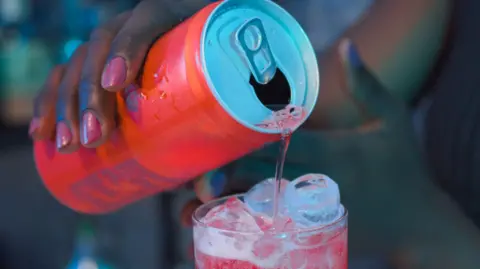 Getty Images
Getty Images
Calm in a can. Relaxation after a few sips.
That's what some drinks companies are promising with beverages formulated specifically to help you chill out.
Lucy and Serena swear by them. They're good friends who, like many, are juggling careers, the chaos of having small children, trying to stay fit, and everything else in between.
"These drinks aren't going to get rid of all my worries and anxieties," Serena says, "but if they give me a little boost - then I'll take it."
Lucy finds them really useful too, especially when she's feeling a bit overwhelmed.
"If I get that low-level panic, then with a drink of Trip or something like it, I can bring it back round."
But after an advert by one of the industry's best-known brands was banned for suggesting its drinks helped with stress and anxiety, there have been questions about whether drinks of this kind are quite as effective as they make out.
BBC News has spoken to nutritionists and dietitians who are sceptical the small amounts of supplements the drinks contain could really bring about that sense of zen.
One psychologist has suggested that we might actually "create our own calm" when we set aside time for ourselves with something that feels like a treat.

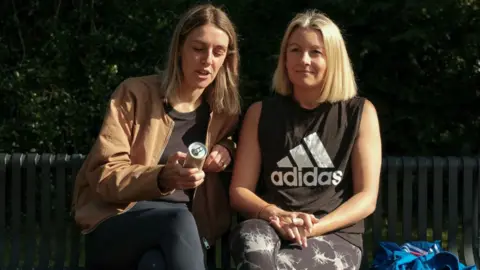 Steven Oakes
Steven Oakes
Lucy and Serena say the drinks can make them feel calm if life gets stressful
The "functional beverage" market - that's drinks with additional health benefits - is booming, with British supermarkets seeing sales jump by 24.5% in the last 12 months, according to one market research firm. Almost 30% of UK households now buy these functional drinks, Worldpanel by Numerator says.
So, what's actually in them that's supposed to help you feel more mellow or give your health a boost? Well, that's where things can get complicated, as each brand takes a different approach.
Along with Trip's Mindful Blend, other companies like Rheal, Grass&Co, Goodrays and supermarket own-brands, advertise that their drinks contain supplements including:
- Lion's Mane extract – a type of mushroom found in east Asian countries
- L-theanine – an amino acid found primarily in green and black tea
- Ashwagandha – a herb cultivated in areas of Asia, Africa, and Europe
- Magnesium – a mineral the human body needs to function properly
These supplements are all commonly found in many health and wellbeing products and are associated with enhancing mood, boosting energy, supporting cognition, and helping with stress.
But how robust is the evidence for that? It's tricky because there are many studies of varying credibility each suggesting different levels of efficacy.
Trip's advert, which suggested its ingredients were stress and anxiety busters, breached the Advertising Standards Agency's (ASA) code, with the ASA ruling that Trip's claims their drinks could "prevent, treat or cure disease" were a step too far.
Trip told BBC News the ruling related to "a single page on the website" and it has made the "changes requested". It says it's confident it's ingredients permit the use of the word "calm" which is "widely and lawfully used by many brands".

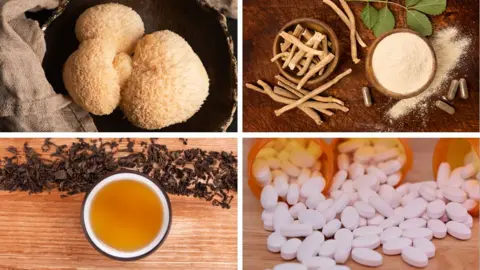 Getty Images
Getty Images
Clockwise from left: Lion's Mane, Ashwagandha root and powder, magnesium supplement pills, and black tea - a source of L-theanine
Dietitian Reema Patel is concerned the amount of supplement in these drinks may not give consumers the emotional balance, feelings of calm, or stress relief that is advertised across the industry. She highlights a growing body of evidence around the funghi Lion's Mane, but says there are no conclusive findings about whether it can have any impact - as yet.
"The research is still very much in its infancy," she says. "In one of the more advanced clinical trials, a small number of participants were given 1800mg - that's at least four times more than what is in some of these drinks."
Studies suggest women are more likely to consume these kinds of supplements, but they're not always front and centre in the research.
The lack of research that includes female participants is partly down to menstrual cycles and fluctuating hormones, making it more "complicated to track", Ms Patel explains.
But these drinks can make a good alternative to drinking alcohol she says, and she has clients who have made the switch from having a wine or a gin and tonic every night to opening a can of one of these drinks to help them unwind.
"I think you can take a lot of the claims with a pinch of salt, but they are definitely giving people that other option."

 Emily May
Emily May
Emily May says older clientele at the coffee shop where she works are really into wellness drinks
Dr Sinead Roberts, a performance nutritionist, says supplements can make a difference, but they tend to work for certain groups of people in specific circumstances - such as high-performing athletes who want that extra edge, or people who are deficient in a certain nutrient - not necessarily for the general population.
If you enjoy the taste, "crack on", Dr Roberts says, but if you want to reduce stress and anxiety you're probably best saving your £2 or £3 and putting it towards a "therapy session or a massage at the end of the month".
"A trace of Lion's Mane or Ashgawanda in a fizzy drink is not going to make any difference," she adds.
Emily May, 25, first discovered these drinks at Glastonbury a couple of years ago. She's not overly bothered about trying to reach a state of zen through them - she just likes the taste.
"I'm ADHD," Emily says, "so I would definitely need a lot more than one of those drinks to calm me down."

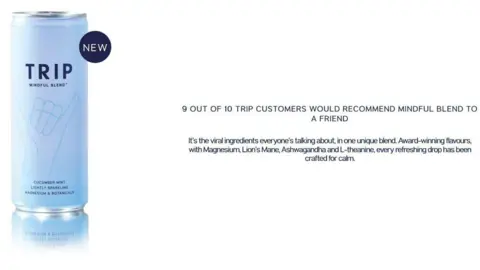 TRIP via ASA
TRIP via ASA
Trip's banned advert made health claims which are prohibited, the Advertising Standards Authority (ASA) said
There is a fine line between advertising that a product will give you a feeling of calm and quiet, and claiming these kinds of drinks will help with mental health problems.
Psychologist Natasha Tiwari says mental health and well-being are "increasingly conflated" in the wellness sector, creating a "toxic mix".
There can be a positive - yet temporary - change in mood and consumers might feel a buzz, she says, not because of the ingredients necessarily, but because "everything around the experience of the product is real".
"So you've bought a drink which, let's say, is a little bit pricier than the alternatives in the market. Therefore you make a commitment to sit down quietly and enjoy it nicely," she says. "You look at the branding - which is lovely and calming - you're processing your environment in the moment, and then actually what you're experiencing truly is a calm moment in your otherwise busy day. That's not fake."
And it's that little window of peace that Lucy and Serena yearn for - and for a few minutes a fizzy drink in a can gives them that, whether the science really agrees, or not.
BBC News contacted all the brands mentioned in this article. Grass&Co told us it's their mission "to deliver high-strength natural adaptogen and vitamin-packed blends formulated by experts... which are supported by approved health claims."
.png)
 4 months ago
19
4 months ago
19
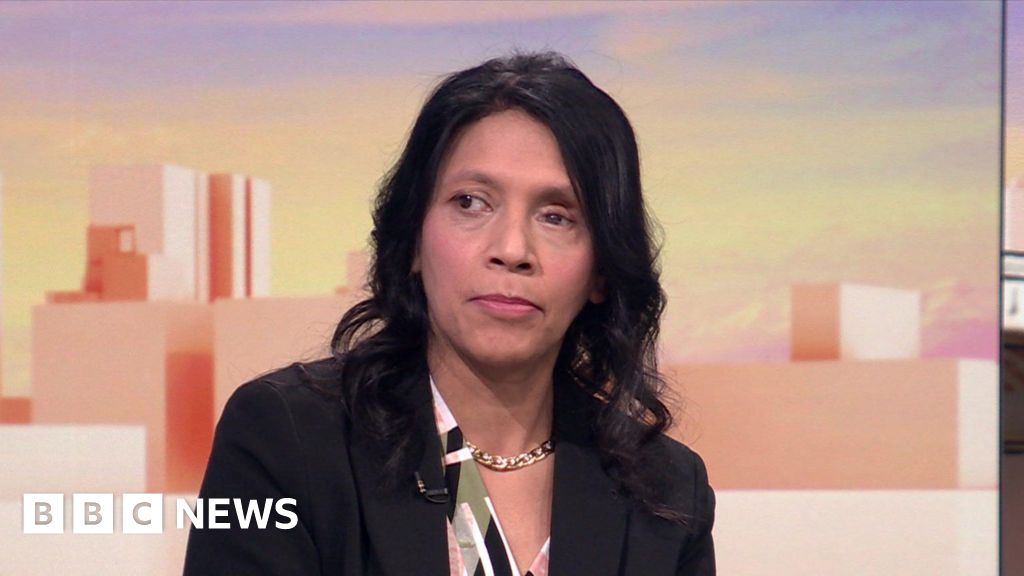
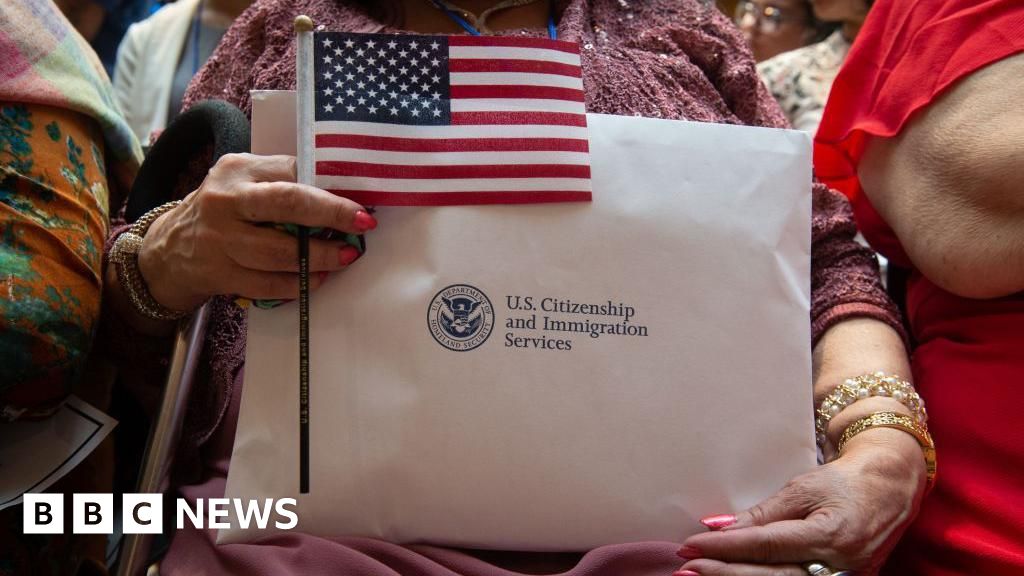






 English (US) ·
English (US) ·